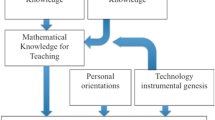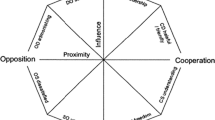Abstract
In this study we examined three preservice elementary teachers’ (PSTs) use of mathematics tasks with English learners (ELs) during a field experience. For each of the first three weeks of the field experience, the PSTs were provided tasks for which to plan a lesson for a one-on-one session with an EL. Drawing on Brown’s (2009) notion of Pedagogical Design Capacity, we analyzed the PSTs’ lesson plans, weekly interviews, and written reflections to identify the ways in which the PSTs’ beliefs about, goals for, and experiences with the ELs impacted their use of the tasks. We were particularly interested in how the PSTs attended to the linguistic aspects of the tasks. We found that the PSTs’ overarching beliefs about teaching drove their desire to remove potential barriers and that they attempted to reduce students’ struggles by modifying the tasks that they were provided. The PSTs utilized a range of modifications, including replacing potentially unfamiliar words, changing contexts, and increasing the white space in the tasks. Though some of these strategies were successful in removing barriers, they did not always facilitate students’ linguistic development. Implications include the need for teacher educators to disrupt PSTs’ notions of effective teaching in the hopes their goals transition from removing barriers to providing scaffolds.








Similar content being viewed by others
Code availability
Not applicable.
Notes
We use the term English learner in this paper because the term is commonly used by the policy leaders and practitioners in the United States, both of whom are parties whom we hope might benefit from this study. This study was set in the context of the United States and there is a history of marginalization in relation to students who are labeled as English learners. We acknowledge the term can be problematic for a number of reasons including its privileging of learning English and the focus on what students lack rather than the resources they already have.
References
Abedi, J. (2010). Research and recommendations for formative assessment with English language learners. In H. L. Andrade & G. J. Cizek (Eds.), Handbook of formative assessment (pp. 181–197). New York, NY: Routledge.
Abedi, J., & Lord, C. (2001). The language factor in mathematics tests. Applied Measurement in Education, 14(3), 219–234.
Abedi, J., Lord, C., Hofstetter, C., & Baker, E. (2000). Impact of accommodation strategies on English Language Learners’ test performance. Educational Measurement: Issues and Practice, 19(3), 16–26. https://doi.org/10.1111/j.1745-3992.2000.tb00034.x.
Aguirre, J., & Speer, N. M. (1999). Examining the relationship between beliefs and goals in teacher practice. The Journal of Mathematical Behavior, 18(3), 327–356.
Brown, M. W. (2009). The teacher–tool relationship: Theorizing the design and use of curriculum materials. In J. T. Remillard, B. A. Herbel-Eisenmann, & G. M. Lloyd (Eds.), Mathematics teachers at work: Connecting curriculum materials and classroom instruction (pp. 17–36). London: Routledge.
Chval, K. B., & Pinnow, R. J. (2010). Preservice teachers’ assumptions about Latino/a English language learners. Teaching for Excellence and Equity in Mathematics, 2(1), 6–12.
Clinton, V., Basaraba, D. L., & Walkington, C. (2018). English Learners and mathematical word problem solving: A systematic review. Educational Foundations and Research Faculty Publications, 6, 1–38.
Cross, D. I. (2009). Alignment, cohesion, and change: Examining mathematics teachers’ belief structures and their influence on instructional practices. Journal of Mathematics Teacher Education, 12(5), 325–346. https://doi.org/10.1007/s10857-009-9120-5.
de Araujo, Z. (2017). Connections between secondary mathematics teachers’ beliefs and their selection of tasks for English language learners. Curriculum Inquiry, 47, 363–389.
de Araujo, Z., Roberts, S. A., Willey, C., & Zahner, W. (2018). English learners in K-12 mathematics education: A review of the literature. Review of Educational Research, 88, 879–919.
de Araujo, Z., Smith, E., & Sakow, M. (2016). Reflecting on the dialogue regarding the mathematics education of English Learners. Journal of Urban Mathematics Education, 9(2), 33–48.
Domínguez, H. (2011). Using what matters to students in bilingual mathematics problems. Educational Studies in Mathematics, 76(3), 305–328. https://doi.org/10.1007/s10649-010-9284-z.
Downey, J. A., & Cobbs, G. A. (2007). “I actually learned a lot from this”: A field assignment to prepare future preservice math teachers for culturally diverse classrooms. School Science and Mathematics, 107, 391–403.
Erath, K., Ingram, J., Moschkovich, J., & Prediger, S. (2021). Designing and enacting instruction that enhances language in mathematics classrooms – A review of the state of the art. ZDM Mathematics Education.
Fernandes, A. (2012). Mathematics preservice teachers learning about English language learners through task-based interviews and noticing. Mathematics Teacher Educator, 1, 10–22.
Fernandes, A. (2020). The language orientations of future mathematics teachers in the United States. REDIMAT - Journal of Research in Mathematics Education, 9(1), 7–29. https://doi.org/10.17583/redimat.2020.4297
Gibbons, P. (1992). Supporting bilingual students for success. Australian Journal of Language and Literacy, 15(3), 225–236.
Grootenboer, P. (2008). Mathematical belief change in prospective primary teachers. Journal of Mathematics Teacher Education, 11(6), 479–497.
Hiebert, J., & Grouws, D. A. (2007). The effects of classroom mathematics teaching on students’ learning. In F. K. Lester (Ed.), Second Handbook of Research on Mathematics Teaching and Learning: A Project of the National Council of Teachers of Mathematics (pp. 371–404). National Council of Teachers of Mathematics.
I, J. (2019). Preservice teachers’ mathematics task modification for emergent bilinguals. School Science and Mathematics, 119(3), 127–141. https://doi.org/10.1111/ssm.12325.
I, J. & de Araujo, Z. (2019). An examination of monolingual preservice teachers’ set-up of cognitively demanding mathematics tasks with emergent bilingual students. Research in Mathematics Education, 21(2), 208–228.
Jackson, K., Gibbons, L., & Sharpe, C. J. (2017). Teachers’ views of students’ mathematical capabilities: Challenges and possibilities for ambitious reform. Teachers College Record, 119(7), 1–43.
Lager, C. A. (2006). Types of Mathematics-Language Reading Interactions that Unnecessarily Hinder Algebra Learning and Assessment. Reading Psychology, 27(2–3), 165–204. https://doi.org/10.1080/02702710600642475.
McLeman, L., & Fernandes, A. (2012). Unpacking preservice teachers’ beliefs: A look at language and culture in the context of the mathematics education of English learners. Journal of Mathematics Education, 5(1), 121–135.
McLeman, L., Fernandes, A., & McNulty, M. (2012). Regarding the mathematics education of English learners: Clustering the conceptions of preservice teachers. Journal of Urban Mathematics Education, 5(2), 112–132.
Means, B., & Knapp, M. S. (1991). Cognitive approaches to teaching advanced skills to educationally disadvantaged students. Phi Delta Kappan International, 73(4), 282–289.
Moschkovich, J. (2013). Principles and guidelines for equitable mathematics teaching practices and materials for English language learners. Journal of Urban Mathematics Education, 6(1), 45–57.
Moschkovich, J. N. (2015a). Academic literacy in mathematics for English Learners. Journal of Mathematical Behavior, 40, 43–62. https://doi.org/10.1016/j.jmathb.2015.01.005.
Moschkovich, J. N. (2015b). Scaffolding student participation in mathematical practices. ZDM Mathematics Education, 47(7), 1067–1078. https://doi.org/10.1007/s11858-015-0730-3.
National Academies of Sciences, Engineering, and Medicine. (2018). English learners in STEM subjects: Transforming classrooms, schools, and lives. Washington, DC: The National Academies Press. https://doi.org/10.17226/25182.?
Pajares, M. F. (1992). Teachers’ beliefs and educational research: Cleaning up a messy construct. Review of Educational Research, 62(3), 307–332. https://doi.org/10.3102/00346543062003307.
Pappamihiel, E. (2007). Helping preservice content-area teachers relate to English language learners: An investigation of attitudes and beliefs. TESL Canada Journal, 24(2), 42–60.
Partnership for Assessment of Readiness for College and Careers. (2014). Practice tests. Retrieved from https://parcc.pearson.com/practice-tests/
Pettit, S. K. (2011). Teachers’ beliefs about English language learners in the mainstream classroom: A review of the literature. International Multilingual Research Journal, 5(2), 123–147. https://doi.org/10.1080/19313152.2011.594357.
Polat, N., & Mahalingappa, L. (2013). Pre- and in-service teachers’ beliefs about ELLs in content area classes: A case for inclusion, responsibility, and instructional support. Teaching Education, 24(1), 58–83. https://doi.org/10.1080/10476210.2012.713930.
Remillard, J. T. (2005). Examining Key Concepts in Research on Teachers’ Use of Mathematics Curricula. Review of Educational Research, 75(2), 211–246. https://doi.org/10.3102/00346543075002211.
Schmidt, W. H., Burroughs, N. A., Zoido, P., & Houang, R. T. (2015). The role of schooling in perpetuating educational inequality: An international perspective. Educational Researcher, 44(7), 371–386.
Smarter Balanced Assessment Consortium. (2014). Practice and training tests. Retrieved from http://www.smarterbalanced.org/assessments/practice-and-training-tests/.
Spanos, G., & Crandall, J. (1990). Language and problem solving: Some examples from math and science (pp. 157–170). Bilingual Education: Issues and Strategies.
Stake, R. E. (1995). The art of case study research. Thousand Oaks, CA: Sage.
Strauss, A. L., & Corbin, J. (1990). Basics of qualitative research: Grounded theory procedures and techniques. Thousand Oaks, CA: Sage.
Yosso, T. J. (2005). Whose culture has capital? A critical race theory discussion of community cultural wealth. Race Ethnicity and Education, 8(1), 69–91.
Zahner, W. (2015). The rise and run of a computational understanding of slope in a conceptually focused bilingual algebra class. Educational Studies in Mathematics, 88(1), 19–41. https://doi.org/10.1007/s10649-014-9575-x.
Zahner, W., Velazquez, G., Moschkovich, J., Vahey, P., & Lara-Meloy, T. (2012). Mathematics teaching practices with technology that support conceptual understanding for Latino/a students. The Journal of Mathematical Behavior, 31(4), 431–446. https://doi.org/10.1016/j.jmathb.2012.06.002.
Zahner, W., Milbourne, H., & Wynn, L. (2018). Developing and refining a framework for mathematical and linguistic complexity in tasks related to rates of change. The Journal of Mathematical Behavior, 52, 21–36. https://doi.org/10.1016/j.jmathb.2018.04.003
Funding
Not applicable.
Author information
Authors and Affiliations
Contributions
Not applicable.
Corresponding author
Ethics declarations
Conflict of interest
Not applicable.
Availability of data and material
Not applicable.
Additional information
Publisher's Note
Springer Nature remains neutral with regard to jurisdictional claims in published maps and institutional affiliations.
Rights and permissions
About this article
Cite this article
de Araujo, Z., Smith, E. & I, J.Y. Preservice teachers’ use of mathematics tasks in relation to their experiences with, goals for, and beliefs about English learners. ZDM Mathematics Education 53, 419–433 (2021). https://doi.org/10.1007/s11858-021-01226-5
Accepted:
Published:
Issue Date:
DOI: https://doi.org/10.1007/s11858-021-01226-5




